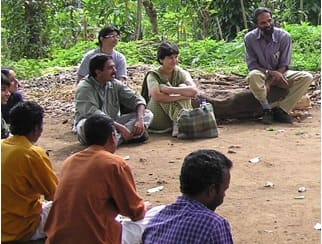
Traditional knowledge
Traditional knowledge[1] is a living body of knowledge, usually held by traditional custodian communities, which explains both the universe and everyday life[2] and can “provide information, methods, theory and practice for sustainable ecosystem management.”[3] Traditional communities pride themselves of maintaining their traditional knowledge alive and strong, with ethical and practical implications for social relations and relations between humans and nature. The metaphor of ‘being in a cultural tradition’ resonates strongly with many traditional communities, even when they daily successfully provide new answers to new challenges.[4]
Many definitions of traditional knowledge have been offered by international organizations and scholars. While with time they appear to converge, there is not yet a consensus definition. A list of recognised main features includes: developed and transmitted in a traditional context – where traditional does not refer to antiquity but to the way it is acquired and used;[5] place-based; experience-based; constantly adapted to the local culture and environment (and often associated with genetic resources);[6] attached to a specific spiritual, cultural, ethno-medical or legal system; often collectively held within a community and among communities; most often orally transmitted from generation to generation.[7]
In the context of ICCAs—territories of life, traditional knowledge constitutes one of the strongest fibres of the bond between a community and its territory, embodying memories of the past and cultural continuity with the future, while providing guidance for the effective governance and management of the territory.
The Convention on Biological Diversity and its Nagoya Protocol[8] state that indigenous peoples and local communities are entitled to the fair and equitable sharing of the benefits arising from the use of their traditional knowledge and associated resources, the right to prior informed consent before the access and use of the traditional knowledge, and the right to negotiate mutually agreed terms on its access and use.[9] Traditional knowledge is valuable in bioprospecting— the development of products from biodiversity components (from drugs and cosmetics to beverages and foods). The misappropriation and unagreed use by someone external to the community custodian of that knowledge is referred to as biopiracy.
Key references:
Scott, 1996; Berkes, 1999; Posey, 1999; Carneiro de Cunha, 2009; Scott, 2013; Morgera, Buck and Tsioumani, 2014; Raymond-Yakoubian, Raymond-Yakoubian and Moncrieff et al., 2017.
[1] Also referred to as ‘traditional ecological knowledge’, ‘indigenous knowledge’ or ‘bio-cultural knowledge’.
[2] Raymond-Yakoubian, Raymond-Yakoubian and Moncrieff, 2017.
[3] IPBES Glossary, definition of Indigenous knowledge/local knowledge systems, available online at https://www.ipbes.net/glossary
[4] Scott 1996; Scott, 2013.
[5] Carneiro de Cunha, 2009, page 82.
[6] Berkes, 1999.
[7] These characteristics, while being often present, are not to be considered as mandatory for the identification of traditional knowledge.
[8] Nagoya Protocol on Access to Genetic Resources and the Fair and Equitable Sharing of Benefits Arising from their Utilization (ABS); see https://www.cbd.int/abs/about/default.shtml/
[9] Morgera, Buck and Tsioumani, 2014.